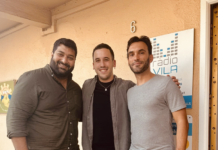I was born in the mid-1960’s in the United States in a comfortable East Coast suburb to a Reform Jewish family. Growing up, my experience of Judaism had included study of the Holocaust and other persecution encountered by Jews throughout our history, but it also was characterized by Jews living prosperously and participating in institutions dominated by Christians without any encounters with anti-Semitism. For my last year of high school, I decided to study abroad in an American school located in Barcelona, which provided an opportunity to live with a local family. That experience exposed me to Catalans who had never fully come to grips with a life marked by defeat in the Spanish Civil War and the humiliation of nearly 40 years of Franco’s dictatorship. It also reinforced a paradox whereby one could enjoy a high quality of life if willing to turn a blind eye to the injustice and persecution that exists in the world.
Several years later, while attending law school in the South of the U.S., I led a large legal aid program providing protection to Mexican migrant farmworkers, which provided me insight into how the powerful often exploit the weak with impunity. Then, as a newly inducted member of the New York Bar, I began my legal career in Barcelona, a city to which I have enjoyed an intimate, personal connection with an ever-expanding group of family and friends of all political persuasions as well as professional relationships among the city’s leading lawyers and politicians.
As I try to give form to the various thoughts I have regarding the Catalan people’s desire for their own state, I have to fight through a wall of indignation which is similar to feelings I experience when entering into debate about other controversial, contemporary issues such as the right for gays to wed, the right for woman to receive equal pay for equal work, the right for Israel to defend itself, and many other rights that seem late in coming or fiercely resisted by those in power, yet once they are established, one asks how it was not always that way. What these deferred rights have in common are the history of victimhood resulting from the unaddressed perpetuation of past discrimination and injustice by those in power. Put another way, if the “bad guys” win, justice arrives late, if at all.
The history of Spain is unfortunately that of the bad guys nearly always winning. This can be hard to understand for an American like me who was educated amidst Hollywood-scripted myths where the cavalry always arrives at the end of the movie to save the day, kill all the bad guys, and have the good people live happily ever after. On the other hand, so many of Spain’s national myths involve casting the “good guys” as the Catholic Castilians who banished the Jews and Muslims (or worse) during the formative period of the Kingdom of Spain and entrenched an ideology of strict dogmatism, and more recently in the 20th century, the Francoists who “saved” Spain from Communists, Anarchists, anti-clericalists, and the disintegration of the Nation into “regions”. Of course, there is also a strong counter-current of genial, anarchic forces, the likes of Cervantes, Goya, Picasso, Miró, Dalí, and Gaudí, who are central to our Modern Western tradition of individual primacy and reaction against dogma, but the swimmers in this current almost always find themselves drowning in the Spanish tide.
As the Catalan independence debate picks up pace in stride with the current economic crisis inCatalunya, Spain, and Europe, I can’t help but thinking about all the missing voices which never survived to see this day. As was the case in Israel where so many potential leaders were eradicated by the Holocaust, in Catalunya most of the country’s intellectuals and politicians went into exile during or after the Spanish Civil War or were killed. Today’s independence movement is largely made up of the descendants of those who decided to remain in the country and in large part hold their tongues during the long and repressive dictatorship of Generalísimo Franco.
The moral ambiguity that this situation arouses in me, which is accentuated by the fact that the majority party in Catalunya’s governing coalition and the Presidency are Convergencia i Unió, a center-right party characterized by its free market economic policies and austerity measures, calls into question whether the current quest for independence is based on national identity or the desire of the Catalan bourgeoisie to further enrich itself (probably a combination of the two). It is perhaps no coincidence that the current push for independence coincides with the Spanish government being controlled by the spiritual heirs of Franco who possess an absolute majority in both Spanish houses of Parliament (largely due to the incompetence of the previous Socialist administration) and use their resistance to Catalan initiatives as a way to rally political support in the rest of Spain.
The moral ambiguity that this situation arouses in me, which is accentuated by the fact that the majority party in Catalunya’s governing coalition and the Presidency are Convergencia i Unió, a center-right party characterized by its free market economic policies and austerity measures, calls into question whether the current quest for independence is based on national identity or the desire of the Catalan bourgeoisie to further enrich itself (probably a combination of the two). It is perhaps no coincidence that the current push for independence coincides with the Spanish government being controlled by the spiritual heirs of Franco who possess an absolute majority in both Spanish houses of Parliament (largely due to the incompetence of the previous Socialist administration) and use their resistance to Catalan initiatives as a way to rally political support in the rest of Spain.
As the independence debate rages, each side searches for solid foundations to support its arguments. I have become frustrated by the dynamic whereby the architecture of injustice is used to legitimize further injustice. One argument often employed is that Catalan secession is unconstitutional. I personally find it untenable that the Spanish Constitution of 1978, whose “founding fathers” were urged to ensure democracy in Spain first and then later worry about democracy reaching the historic “nations” of Spain which were awkwardly denominated as “Autonomous Communities”, can be held sacrosanct as if it were the equivalent of the U.S. Constitution which has endured for more than two centuries and stood the test of time. Even less legitimate is the invocation of King Juan Carlos I, the hand-picked successor ofGeneralísimo Franco, as somehow a strong advocate of Spanish democracy and integrating figure when I would argue that his intervention in foiling the coup d’état on February 23, 1981 was good politics and shrewd self-preservation (history will ultimately determine whether his former mentor, General Armada, temporarily enjoyed his support to restore military rule). Catalan separatists are evenly divided between those who view the King’s existence as an anachronism in what should be a progressive and democratic Spanish State and others who are indifferent to what exists in a country that they regard as foreign to them. My guess is that the Spanish monarchy’s days are numbered as the various relics of 20th century Spain are eventually relegated to history, but this would be the subject of a separate essay. My only point here is that just because the status quo in Spain would appear to dictate certain outcomes, I believe that eventually moral imperatives will expose that the status quo is merely the perpetuation of injustice.
One can look at other situations throughout Europe, e.g. Scotland, Flanders, Slovakia, and the Balkans, to analyze the current situation in Catalunya, but it is impossible to find exactly the same circumstances, whether political, economic, linguistic, or historical, to allow an exact comparison. Politicians and historians can cite criteria that could apply, but in the end, there is likely no better way than peaceful elections conducted transparently after a campaign where all opinions can be fairly expressed. The Catalan government currently is seeking merely this reasonable objective. However, it is easier said than done.
I believe that there were dark forces at work to derail the independence movement during last November’s Catalan parliamentary elections called early by President Mas with the intention of expanding his parliamentary majority to better achieve his goal of independence. On the eve of the election fabricated charges were leveled against President Mas accusing him of hiding large Swiss bank accounts from the public, which caused a political backlash resulting in his party’s loss of many seats which ultimately were reallocated to the left-wing Catalan independence party (Esquerra Republicana de Catalunya). The results of an investigation completely exonerating President Mas of these accusations arrived months later once the damage had been done and barely breached the headlines when published. Most significantly, in these reports of exoneration, there was no accusation of responsibility for the fabrication and no call for an investigation. When President Mas responded by suing the publishing newspaper for libel in Catalan courts, the centralized judiciary ruled on appeal that the case would need to be heard in a Spanish court, once again suggesting that impunity is rampant in Spain today. A further indictment of the partisanship of the Spanish judicial system lies in the persecution of Spain’s most famous judge, Baltazar Garzon, who after spending years bravely fighting corruption in the governing Partido Popular, remains the sole individual to have lost his job. Without an impartial system of justice and a vigorous press, which is often found lacking in Spain, or at least not as robust as the press in other leading democracies, the prospect of free and fair elections in Catalunya is quite remote.
Another significant obstacle to the achievement of Catalan independence is the constant in-fighting among Catalan political parties and social leaders. Historically, the centralizing powers in Madrid have prevailed by negotiating agreements piecemeal with key elements of Catalan society (including leaders of the press, the banking industry, and other areas vital for achieving independence) who often view their Catalan rivals as negatively as the Spanish powers that be. Equally detrimental is the lack of an indisputable, charismatic leader capable of unifying the Catalan independence movement. The fact that the leading center-left force in Catalan politics (Partit Socialista de Catalunya) is structured as a branch of the Spanish Socialist Party has rendered it virtually irrelevant in current Catalan politics with its consequent relegation from the governing party to the third most represented party in the Catalan parliament in the short period of time during which Catalan independence has replaced economic stewardship as the primary issue in the minds of Catalan voters. This situation is unfortunate because I believe that the winning Catalan political platform today would be a center-left, pro-independence party which would combine nationalist voters with progressive voters less accepting of austerity initiatives and dismantling cultural initiatives, many of which involving public education in Catalan and promoting Catalan culture. Instead, Catalunya is uncomfortably governed by a coalition of center-right Convergencia i Unió and left-wing Esquerra Republicana de Catalunya. It is important to recognize that much of the base of the Partit Socialista de Catalunya was found in predominantly Spanish-speaking areas of Catalunya, but it is also true that this party had formed an umbrella over numerous segments of voters and its splintering in the future is not out of the question. How any future election campaign is waged, how any referendum question(s) are phrased, and how successful each side is at turning out their voters and energizing their respective voter bases are unknown variables at this time and can be affected substantially by any dark arts, manipulation, or intimidation that could be brought to bear by the Spanish State or other actors in the process.
Other considerations that frequently enter into discussion regarding secession involve the circumstances surrounding an independent Catalunya’s membership of the European Union. I find it inconceivable that the EU would not welcome with open arms one of the most pro-EU areas of Western Europe at this time. Catalunya is cosmopolitan by nature, export-oriented by design and necessity, and shares so many of the values that the EU works so hard to promote. Nonetheless, it would not be surprising if the Spanish State and other EU states with secession issues of their own erect insurmountable obstacles to Catalan accession to EU membership. It would be wrong for this to become a big referendum issue due to its perpetuation of past injustice, but I expect that threats to block EU membership will be used by the Spanish State to intimidate Catalan voters. Similar scare tactics might involve the transfer of Spanish State debt to a new Catalan state that would be unsustainable and disastrous in terms of Catalunya ever emerging from its current economic troubles. On a more practical level, there could be issues involving pensions held in accounts controlled by the Spanish State, tax collection, judicial proceedings, and myriad other matters heretofore controlled by the central government in Madrid. There are and will be many vested interests that would be disturbed by Catalan independence. In any scenario, idealistic aspirations are bound to collide with political and economic interests, and the collision will likely be unpredictable and demoralizing.
The timing and conditions of any referendum could also be a crucial determinant of the independence process. There is great symbolic value of holding the referendum in 2014 to coincide with the 300thanniversary of the loss of Catalan self-government resulting from military defeat (I personally hope that the Catalan vote is held prior to the Scottish referendum because I believe the Scottish nationalists will fail and could have a ripple effect in Catalunya). How the economy is faring, how the campaign is waged, and how many voters are eligible to vote will be big influences on the outcome. On this last point, it is interesting to note that the pro-independence parties are advocating a lowering of the voting age to include what they believe will be largely sympathetic voters to their cause. I should also say a few words about immigrants in Catalunya.
Since the post-WWII economic boom beginning in the late 1950’s Catalunya has been redefined as a destination for immigrants due to its fast-growing, export-oriented economy. The first wave of immigrants was largely from the poorer regions of Spain as agricultural jobs were eliminated or not as desirable as industrial jobs. The children of many of these immigrants were educated in Catalan and their views are spread throughout the political spectrum. It is important to note that President Mas’ Socialist predecessor, José Montilla (1955, Iznajar, province of Cordoba in Andalucía), was the first President of the Generalitat who was not born in Catalunya. The second wave of immigrants, coinciding with the building boom then bubble of the late 1990’s up until 2007, was largely from Spanish-speaking South American countries, North Africa, Pakistan, and other Asian countries. Many of these immigrants have been forced to return to their countries of origin due to the implosion of the construction industry and lack of work in Catalunya, and it remains to be seen how many of these immigrants will be eligible or present to vote. One would expect that these immigrants would see advantages to living in a Catalunya forming part of Spain, though it should be noted that the process of integration of immigrants primarily via education in Catalan is a tribute to the Catalan government’s policies and the immigrants themselves (as well as a manifestation of the fundamental Catalan values of tolerance for racial and ethnic diversity and support for those who wish to better themselves and their families through hard work and risk-taking). As an American, these Catalan values resonate with me and provide further sympathy for Catalan independence.
Each Catalan voter will ultimately have to look into his or her own heart, pocketbook, or other place from which a decision can be made when inside the voting booth. I do not expect it will be an easy decision for many voters (the consensus of polling shows roughly 50% in favor of independence, 20% against, and 30% undecided). Some will vote based on whether they feel more Catalan or Spanish. Others will attempt to undertake a more complicated analysis. There may be concerns about language, the potential of a smaller state to succeed, European membership, rights of minorities, and the quality of governing politicians, among many other matters.
As part of the referendum process, reasonable and practical guidelines will need to be established regarding the logistics of a potential secession. However, I do not believe that the Spanish State should be allowed to place roadblocks in the process of secession. If this is permitted, independence will be easily frustrated. I also believe that the regions of Spain should not be allowed to vote on “allowing” Catalunya to secede, especially since a material part of their spending has been subsidized by Catalan tax revenues. The Spanish government will continue to urge Catalunya to postpone its national aspirations until the economic crisis has subsided, in a similar dynamic to when these aspirations were postponed in the name of consolidating Spanish democracy in 1978. President Mas has rightfully rejected this argument, citing his belief that the social and economic welfare of Catalunya and its national aspirations are inextricably entwined. It is incumbent on the Catalan people and politicians to find their own way to a socially cohesive and prosperous society, and destroying their economy with all the social consequences that this would engender makes no sense at this time to those who believe that Catalunya is a separate country from Spain.
In a world where justice is done, the results of an election should be respected. Unfortunately, Spain is a country where the “bad guys” always seem to find a way to prevail, set the rules, and uphold the status quo. Catalan independence has been a peaceful movement to date, but one has to wonder, particularly in an environment where economic crisis reigns and Madrid is unflinching in its repression of Catalan aspirations, how long this peace can last. Most of the democratic world remained detached and witnessed the Fascist devouring of a Spain ripped apart at the seams in the 1930’s. One wonders how democrats will react if Spain once again erupts in violence, this time on the road to Catalan independence. My objective is to promote awareness of the legitimacy of the Catalans’ national aspirations and engage others to do the same so that any fighting shall be verbal sparring on the editorial pages of newspapers, on websites dedicated to serious political discourse, and on the streets and terraces of the cities and villages of Catalunya, and ultimately a final, binding decision may emerge from the voting booths of a democratic Catalunya.
In earlier times, I had observed a paradox whereby one could enjoy a high quality of life if willing to turn a blind eye to the injustice and persecution that exists in the world. Today in Spain, it is increasingly difficult to reconcile quality of life and injustice. Finally we may have reached the moment of collective declaration to expose injustice, confront power, and start living the truth.
















